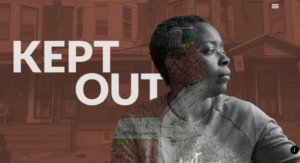Back in—I think it was early1986—Beth was several months into blindness, and a baby was on the way. And I was out of work. At first, unemployment was by choice. I was home to help Beth in the early months of learning to live in a completely different way. Before she lost her sight, we’d made the decision to move out of an old house on Urbana’s tree-lined streets to a somewhat dingy campus apartment that had the virtue of being extraordinarily cheap. It was owned by an eccentric physician who, while he didn’t do a lot of upkeep, kept the cost low for impoverished students and people like us. Beth had put her name on a waiting list years before, and a space had opened. I think it was $135 a month, all utilities included.
We took it on the idea that it would allow us to save money to buy a place of our own some day. Instead, it was something of a lifesaver during a difficult period. But even cheap rent is rent, and as our savings dwindled I had to find some work. I put out applications everywhere that had any kind of work that I was trained for—in Champaign-Urbana that was a pretty finite universe. So I also looked for, well, anything.
I eventually got a call from a property manager for a local apartment building owner. They needed a leasing agent—someone to take calls, show properties, follow through on leases, etc. They offered and I took the job.
A woman walked me through the tasks, and took me on a ride-along showing or two. I think I did a couple showings on my own before the property owner took me aside. He talked about the nitty-gritty details when it came to getting security deposits and first month’s rent, how to size up potential renters, etc.
Along the way, he sort of hushed his voice and said, “If they’re black, don’t accept a check—ask for cash for security deposit and first month’s.” I must have gotten a look on my face, because then he tried to offer some explanation.
It was a jolt, an eye-opener, and a moral crossroads. If I were in today’s skin, in today’s circumstances, I would’ve popped a rivet. Back then we were pretty beat up and needy. I didn’t say anything. I went home, told Beth about it, and we both stewed.
I went back, dreading having to possibly deal with the owner’s edict. And then I was rescued by a phone call: A local printing company was interested in hiring me. Not exactly my field, but enough for me to end my short-lived real estate career.
I anonymously left a tip for the local tenants’ rights organization. If I had it to do over, I would’ve given my name.
I hadn’t given the incident a thought in decades until Beth happened onto an NPR program called Reveal. Produced by The Center for Investigative Reporting, it covered the results of a yearlong study The Center had done on mortgage lending to black and other minority applicants.
The radio program is based on an extremely thorough piece of work, and I chose to read rather than listen to it. The piece is part of a series called Kept Out. I can’t cover the complexities—I just hope you’ll read it. Bottom line: It found that blacks and other minorities were turned down at rates much higher than whites. This was true even when correcting for multiple factors including income.
Now, one factor not included was credit score. The lenders, when questioned about potentially discriminatory practices, all defended their practices and said that the missing link in the study was credit scores. The Center had requested scores (in aggregate, not identifying individuals, of course)—something the lenders resist, making it impossible to verify their stance. And making me smell a rat.
And even if the scores were made available, there’s this passage from the piece:
At the same time, studies have found proprietary credit score algorithms to have a discriminatory impact on borrowers of color.
The “decades-old credit scoring model” currently used “does not take into account consumer data on rent, utility, and cell phone bill payments,” Republican Sen. Tim Scott of South Carolina wrote in August, when he unveiled a bill to require the federal government to vet credit standards used for residential mortgages. “This exclusion disproportionately hurts African-Americans, Latinos, and young people who are otherwise creditworthy.”
One of the findings of the study was particularly disheartening: Geographically, the imbalanced lending practices more or less followed boundaries set by the old government-endorsed redlining system that operated from 1937 to 1968.
It’s like stacking the deck is in our and our institutions’ DNA.
Back when I had the leasing job in 1986, I was naïve enough to think we were past all this stuff. I would never have predicted that today, apparently, we still aren’t.

Hi Mike and Beth. It’s Mary Heithoff Clauss, Beth’s friend from year’s past. I am just dropping a note to say how much I enjoy your blog posts, both Beth’s and Mike’s. They are informative and heartfelt. Keep them coming!
Hi Mary, great to hear from you. You’re forever part of the folk lore of our lives, ever since we hitched a ride with you, and our destination a party where I was introduced to Beth’s clan.
Leave a Response